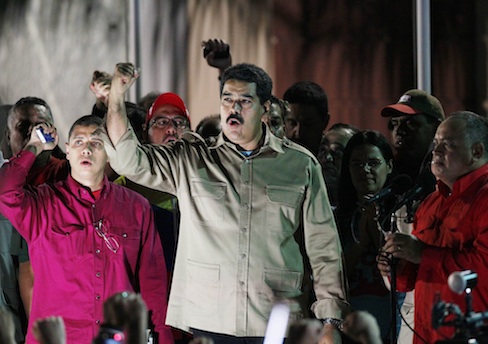Venezuela’s legislature granted its president sweeping decree powers Tuesday in a move that suggests not much has changed since the death of longtime strongman Hugo Chavez, experts say.
President Nicolás Maduro, who succeeded Chavez after his death from cancer in March, will now be permitted to launch an "economic offensive" against rampant food shortages and inflation in Venezuela. Maduro has blamed the country’s economic woes on private businessman colluding with agents of the U.S. government, much like Chavez.
The legislature was able to pass the measure, requiring a two-thirds supermajority, only after it brought a case against a dissenting lawmaker and removed her. That is an important distinction from the method used to grant similar powers to Chavez, said Arch Puddington, vice president for research at Freedom House, in an interview.
Chavez by contrast would obtain decree powers from a "lame-duck" legislature before newly elected lawmakers from opposition parties took their seats, he said.
"This was not just a normal legislative action," he said. "They had to use rather undemocratic methods in order to give them the majority to take this measure."
Maduro is expected to continue a crackdown on private businesses in the country that began earlier this month. Calling businessman "barbaric" and "capitalist parasites," he ordered the arrests of dozens of them and forced others to slash prices on plasma TVs, stereos, household appliances, and toys.
Chavez used a similar tactic to win reelection last year, giving away cheaply-made Chinese appliances such as refrigerators to buy votes, Puddington said.
"Maduro seems not to have had the access to the hardware, so he basically gave away things that belonged to other people," he said.
The government intervention appeared to be publicly popular as people flooded the stores and obtained goods at sharply reduced prices, but the long-term economic benefits are questionable, Puddington said.
Venezuela’s inflation rate climbed at its quickest pace since 1997 to 54.3 percent last month, as the country experienced its highest shortages of toilet paper, cooking oil, and other basic goods in years. Economists say government initiatives like currency controls have further reduced investment and forced businesses to turn to the black market for money to buy imports.
Puddington said the government’s "corrupt" economic policies will have far-reaching implications for both Venezuela’s future leaders and its people.
"They will have inherited a society in which many people have expectations that the state will provide, and there are limits to this," he said. "You’re already seeing those limits in Venezuela, and the fact that Venezuela is a potentially wealthy society because of its natural resources makes that all the more tragic."
Maduro will have the power to issue commandments without congressional approval for up to a year after Tuesday’s vote. Not all lawmakers were happy.
"You have ruined, persecuted, and expropriated," María Corina Machado, a staunch opponent of Maduro, said during a hearing. "Everything you touch you ruin. Everything you touch you asphyxiate and corrupt. This has generated unemployment, shortages, pain, and misery in Venezuela."
As Venezuela continues its authoritarian streak and other countries like Nicaragua move in that direction, some observers have questioned whether the United States is doing enough to promote democracy in the region.
Secretary of State John Kerry raised some eyebrows Tuesday after telling a crowd at the Organization of American States that "the era of the Monroe Doctrine is over."
The announcement was greeted with lukewarm applause.
"That's worth applauding. That's not a bad thing," he said.
The nearly 200-year-old Monroe Doctrine originated as a statement of opposition to European colonialism in Latin America and was later used by the United States to intervene in the region at times to promote stability, a position that was not always appreciated by countries there. Venezuela’s El Universal reported Kerry’s announcement as the "end of the [U.S.] interventionist policy in Latin America."
Kerry said the United States should seek equal partnerships with countries in the region to achieve common goals.
Even if the United States does not state it publicly, Puddington said officials should remain vigilant and work behind the scenes with non-governmental organizations and human rights groups to promote democracy in the region.
"Speaking out in a strong voice about a Chavez or a [Rafael] Correa in Ecuador—there are times that that might not be the best strategy," he said. "At the same time, if we’re not going to speak out on these issues we should be providing quiet assistance to democratic forces and working with other democracies in the region to strengthen an alliance against authoritarianism."
